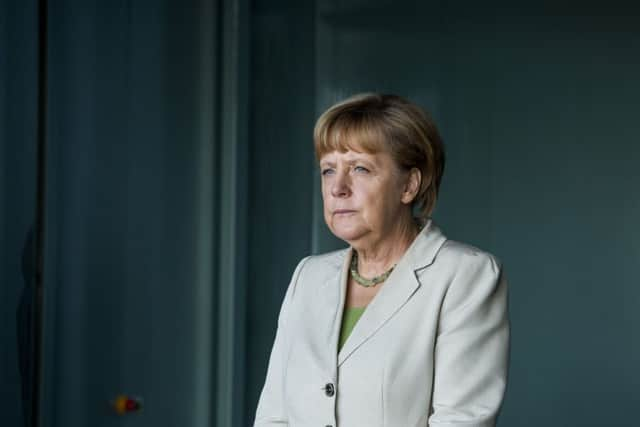Article 50 explained as Theresa May prepares to start Brexit


The Prime Minister is reportedly considering a u-turn on plans to raise the National Insurance contributions of Britain’s self-employed.
With that in mind, the spectre of Brexit is a relatively sedate issue by comparison, and could even be used to quieten Tory backbenchers restless about the budget.
Advertisement
Hide AdAdvertisement
Hide AdThe Prime Minister is anxious to get the ball rolling on Britain’s departure from the European Union and has set herself a deadline of the end of this month to formally start that process.


We look at whether the rumoured date of the 15th is achievable, the potential roadblocks, and just how and when Theresa May might continue the journey from the EU that started in June last year.
What is Article 50?
Article 50 is one of the sections of the Lisbon Treaty, which was ratified by EU members in 2009, and was designed to reform the Union.
Article 50 sets out the formal process by which a member state of the EU can withdraw from the body – after previous treaties hadn’t made this route clear.


This exit, or withdrawal clause, sets out a two year window in which the member state negotiates its departure with other states and EU officials.
European officials are gearing up for the negotiation with Britain, but given this is the first time a fully fledged member has the EU, the path ahead for both sides remain decidedly unclear.
Theresa May has decided that a Brexiteer, David Davis (who is a long-standing Eurosceptic) should lead the negotiations on behalf of Britain.
In EU terms, there may be a central team, but the discussions can’t be strictly unilateral with 27 other states involved.
Advertisement
Hide AdAdvertisement
Hide AdOnce the starting gun is fired by May, it is a race against time for officials on both sides to get a deal done within the two-year window.
How will it be announced?
Theresa May doesn’t exactly have a flair for the dramatic, but that doesn’t mean that she knows how to make a splash with her announcements.
The Prime Minister took to the Tory Party conference last year to give herself the March deadline, so there may be a similar address to some members of the party faithful to announce the next big step has been taken.
Perhaps the most constitutionally responsible thing would be for May to come to the House of Commons to announce to MP’s (or even peers) that the EU had been put on notice.
That has its own problems, with rival MPs able to heckle and interrupt with points of order, the need to give the opposition a response, and even procedural issues with speaker John Bercow.
Expect May to go for an understated press conference.
Will we be out by April 2019?
In theory, yes. But in practice, there’s no guarantee that negotiations will go smoothly and we’ll be waving goodbye to our former colleagues within the set time period.
Article 50 doesn’t allow Britain to simply extend the negotiation period, as the time limit is designed to ensure that discussions go smoothly.
Nor does it allow any of the 27 other member states to decide that they’ve had enough of the negotiations and want them to go on longer.
Advertisement
Hide AdAdvertisement
Hide AdOnce Article 50 is triggered, the treaties that dictate the rules of member states don’t apply to Britain, so there isn’t any way to simply extend negotiations indefinitely.
It takes 28 to tango in these negotiations, and Britain and all the other member states would need to unanimously agree to extend the timescale.
It’s unlikely that Theresa May’s backbenchers would allow her to extend that deadline, itching as so many of them are to ‘take back control’ so it stands to reason we will almost certainly be leaving the EU within the agreed time period.
Domestic concerns
There are a number of factors in British politics that could further compliment an already hugely complex Brexit process.
Our own First Minister, Nicola Sturgeon, is currently threatening another independence referendum if Scotland doesn’t get a bespoke Brexit deal.
While it is unlikely that her European Union minister Mike Russell will suddenly find himself round the table with the other member states, Theresa May could tailor some of her negotiation positions on the basis of keeping Scotland in the Union.
There’s also the tricky situation in Northern Ireland, which is currently without a devolved administration after sweeping gains by Nationalists opposed to Brexit.
The prospect of a return to a ‘hard border’ between Northern Ireland and the EU-friendly Republic is another pressing issue that has gained little traction in the UK.
Advertisement
Hide AdAdvertisement
Hide AdResolving this could be a precursor to negotiations with EU partners, some of whom have little sympathy with the UK seeking to retain a version of a border-free zone after voting to leave one.
Getting the Republic of Ireland, a traditional ally, onside in what could be stormy talks is crucial for Theresa May, making resolving the border issue a priority.
Irish Premier Enda Kenny yesterday backed the concept of a controversial ‘Brexit Bill’ that would see the EU charge the UK around £50bn to leave – proving he’s the type of shrewd politician whose help May will need.
International Considerations
Britain, no matter how far ahead in the polls the Tories are, still feels like it is a number of years away from another election.
So, flawed as it may be, the current Tory vision of Brexit is the one that will be used to take Britain out of the EU.
That might not be the case for some of our traditional allies in the bloc.
Arch-Eurosceptic Marine Le Pen looks set to win the first round of the Presidential election in France, but should fall short in the run-off, according to the polls.
But according to the polls Britain was set to vote to stay in the European Union last year, so there could still be shocks ahead come May.
Advertisement
Hide AdAdvertisement
Hide AdA federal election in Germany is scheduled for September this year, with the results informing Angela Merkel’s negotiation stance before, during, and after the crucial vote.
With so much going on, Article 50’s triggering next week looks set to be just the start of a long and arduous process.